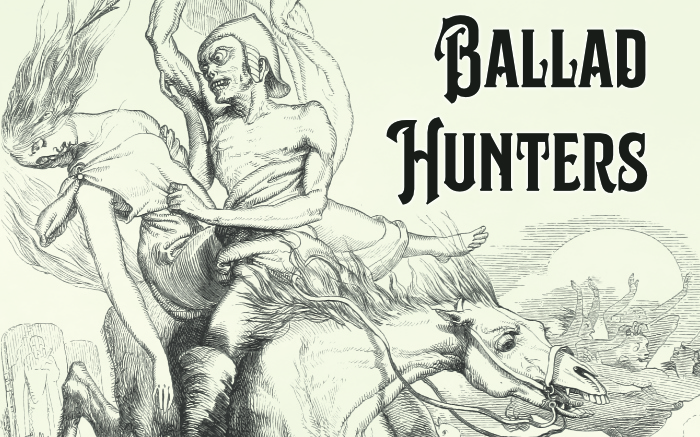The strange Old English manuscript called the Exeter Book includes a bunch of really fun riddles suitable for use at the gaming table. Riddling doors in dungeons, riddling fey encountered on the road, riddling hermits sought out in their hidey-holes: all can be stocked with a riddle or two from the Exeter Book!
This post is brought to you by beloved Patreon backer Arthur Brown. Thanks, Arthur—you rock!
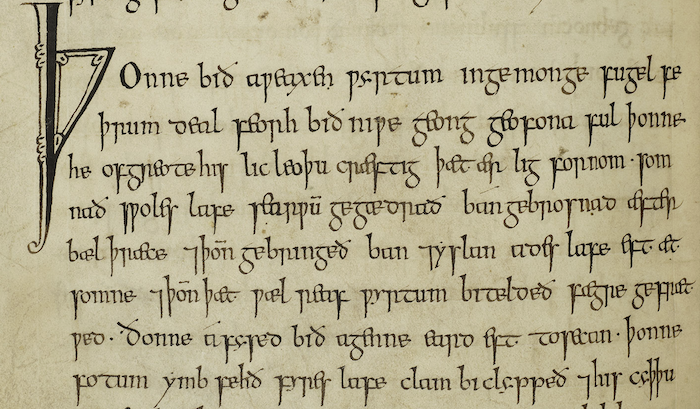
The Exeter Book is bizarre text. It was written late in the 10th century, probably in Exeter, England, and donated to the Exeter cathedral library by the bishop. The book is an anthology: a random-seeming collection of whatever its compiler felt like including, in whatever order the sources came to hand. It’s got poems, Christian sermons, pagan elegies, monologues, and saints’ lives. It’s written in Old English, the Germanic language of Britain’s Anglo-Saxon settlers. Most importantly for our purposes, the book includes about a hundred riddles in verse: the Saxons loved their poetry, and they loved riddles.
Riddles have a long and contentious history in tabletop RPGs. Riddling is fun—a good riddle has double meanings that are genuinely delightful to disentangle. But a decent number of folks have had bad experiences with GMs who present the PCs with bad riddles, then punish the party for not getting the riddles right. It’s been enough to poison the whole idea of riddles for some players. So before we dive into the Exeter Book’s riddles, some riddle advice:
Riddles should be optional. Sure, the PCs need to impress the old lady so she’ll tell you where the McGuffin is buried, and she loves riddles. But you don’t have to answer her riddles to impress her. You could help her neighbor move and impress her with your generosity, or tell her about your academic research, or any of the other ways humans impress one another. In a dungeon, a riddling door can’t be the only way to reach the lost shrine. You shouldn’t be having “one way” to get to anything in a dungeon anyway. Use looping paths so that the party can choose to expend more time and face more danger getting to the lost shrine via a different route instead of spending twenty minutes fruitlessly trying to solve one riddle.
And, though I concede it’s super lame, if any of your players say, “My character is smarter than I am; she would solve this even if I fail,” that player is entirely correct. If the players are truly stumped but insist their characters would want to approach this problem by answering the riddle, let the players roll to see if their characters could answer it. As long as everyone’s having fun, it doesn’t matter if the players are doing things “the right way.”
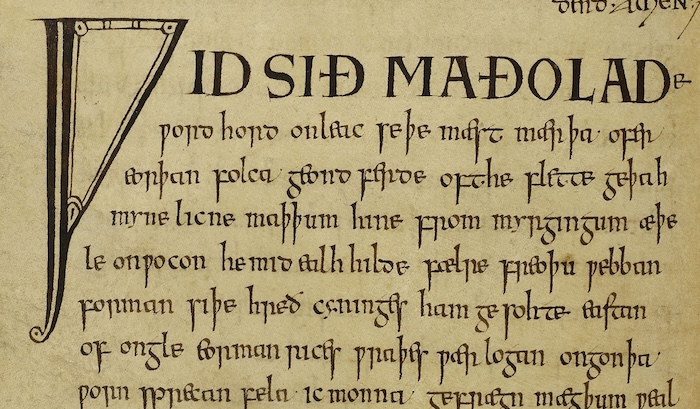
First, we have two riddles that are great for situations where the players don’t have to answer right away. For a certain kind of player, it can be fun to present them with a puzzle that they can work on over multiple sessions. When their character doesn’t have anything going on in a scene, the player can work on the puzzle in the background, happily occupied. These two riddles are that kind of puzzle.
(I’ve put the answers after the next image)
A thing came marvelously moving over the waves
Comely from the keel up. It called out to the land
Loudly resounding. Its laughter was horrible
Awful in its place. Its edges were sharp
Hateful it was, and sluggish to battle
Bitter in its hostile deeds. It dug into shield-walls
Hard, ravaging. It spread mischievous spells.
It spoke with cunning craft about its creation:
“Dearest of women is indeed my mother
She is my daughter grown big and strong
It is known to men of old, among all people
That she shall stand up beautifully everywhere in the world.”
I was along the sand, near the sea-wall
At the water’s edge, and firmly fixed
In the place of my birth. Few men there were
Who looked upon my home of solitude.
But at every dawn the dark waves held me
In their watery embrace. Little did I think
That ever I should sooner or later
Speak without mouth over the mead-bench
Exchange words. This is a kind of wonder
Curious for the minds of such as understand not
How the point of a knife and a right hand
And a prince’s thought purposely fashioned it.
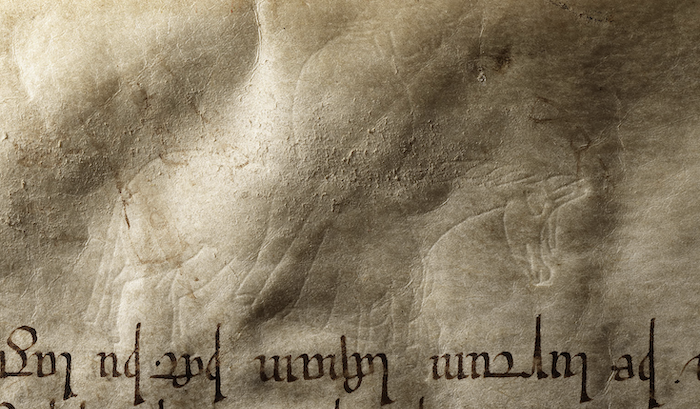
The first is an iceberg, slow but deadly as it damages ships. The mother-daughter relationship is straightforward: water into ice, ice into water.
The second is a reed, plucked from the shore and cut to become a pen or writing implement. I like this one because it’s very straightforward, but it’s describing a scene that a modern riddler is not going to immediately think of.
Next we have an absolutely terrific riddle to be posed by a door in a dungeon. The riddle is inscribed upon the door, and all efforts to open the door fail. As discussed above, you need to provide other—longer and more dangerous—routes into the room behind the door, but answering the riddle is the fastest.
I saw a tree with bright branches
Stand high in a grove. The tree was happy
The growing wood. Water and earth
Fed it well, till wise with time
It met with a change: it was deeply hurt
Dumb with bonds, covered with wounds,
But adorned in front with dark ornaments.
Now it clears the way for a treacherous foe
Through the might of its head. By storm they plunder
The hoard together.

The answer is a tree cut down and made into a battering ram. You can make this into a double-puzzle: in order to open the door, the party has to cut down a tree and use it as a battering ram on the door. If they do so, the door springs open at the barest touch from the tree-ram. If the party gets into the room a different way, once they get into the room they find a makeshift battering ram behind the door, where it was set down after the last group of adventurers to come through opened the door.
Next we’ve got two dirty riddles. When you offer one, the players will surely exclaim that the answer is “penis,” and then you can say “what? no!” and make them try another answer. Pretending not to be aware of the vulgar is a fun little ritual we all played as children, and replaying it as adults can be entertaining—once.
I’m a wonderful thing, a joy to women
To neighbors useful. I injure no one
Who lives in a village except my slayer.
I stand up high and steep over the bed.
Underneath I’m shaggy. Sometimes ventures
A young and handsome peasant’s daughter
A maiden proud to lay hold on me.
She seizes me, red, plunders my head
Fixes on me fast, feels straightway
What meeting me means. Wet is that eye.
I saw the thing. Its belly was at the back
Hugely puffed out. A servant attended it
A man of might. And much had it suffered
When that which filled it flew from its eye.
It does not always die when it has to give
What is in it to another. But there comes again
Reward to its bosom. Its bloom returns.

The first is an onion.
The second is a bellows.
Finally, I leave you with five good riddles and one absolutely absurd one.
Not silent is my hall, nor I myself am loud
For us two the Lord ordained
Our ways together. I am swifter than he
And at times stronger. He is more enduring.
Often I rest. He must run on.
With him is my home all my life long.
If we two are parted, my death is destined.
I war oft against wave and fight against wind
Do battle with both when I reach to the ground
Covered by the waters. The land is strange to me.
I am strong in the strife if I stay at rest.
If I fail at that, they are stronger than I
And forthwith they wrench me and put me to rout.
They would carry away what I ought to defend.
I withstand them then if my tail endures
And the stones hold me fast. Ask what my name is.
In those first days my father and mother
Left me for dead: there was no life yet
No life within me. Then a kindly kinswoman
Faithfully covered me with her own clothing
Held me and cherished, kept me warmly
Even as gently as her own children
Until beneath her, as my destiny willed
I waxed into life with my alien fellows.
My friend and protector nourished me then
Till I grew and grew able to go forth by myself.
Because of this now her own dear children
Sons and daughters, were fewer, alas.
Christ, the commander, the true lord of victories
Ordained me for conflict. I burn the living
Unnumbered mortals, over all the earth.
I afflict them with pain, yet never I touch them
Whenever my lord bids me to battle.
Sometimes I gladden the minds of many.
Sometimes I comfort those I make war on
Even from afar. They feel it, nonetheless.
The sea fed me. The water-helm was over me
And waves covered me, close to the ground.
I was footless. Often toward the water
I opened my mouth. Now people will
Eat my meat. They want not my skin.
When they rip my hide with the point of a knife
Then they eat me uncooked.
A creature came where many men
Sat at council with wise hearts.
It had one eye and its ears were two.
It had two feet and twelve hundred heads
A back and a belly and two hands
Arms and shoulders, one neck
And two sides. Say what I’m called.

A fish and its river
An anchor
A cuckoo bird
The sun
An oyster
A one-eyed garlic seller
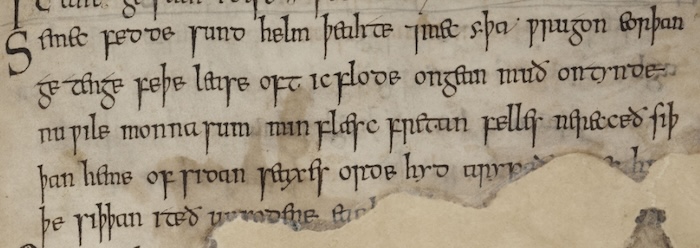
Make sure you don’t miss a blog post by subscribing to my no-frills, every-other-week mailing list! I also have a signup that’s only for big product releases!
Looking for material for your game tonight? My back catalog has hundreds of great posts, all searchable and filterable so you can find something from real history or folklore that fits exactly what you need!
Come follow and chat with me on social media! On Bluesky, I’m @moltensulfur.bsky.social. On Mastodon I’m @MoltenSulfur@dice.camp.
Sing and fight magical folk ballads in 1813 England and Scotland! This free early-access edition has everything you need to play a Ballad Hunters one-shot about the traditional song Barbara Allen.
The game has:
– Investigative adventures centered around the lyrics of traditional British ballads
– Simple, story-driven rules inspired by the GUMSHOE engine
– A historical setting that is grim but hopeful
– Magic where characters make ballad verses come to life
Ballad Hunters is the sequel to Shanty Hunters, winner of a 2022 Ennie Award (Judge’s Choice) and nominee at the Indie Groundbreaker Awards for Most Innovative and Game of the Year.
You can download the free early-access version of the game from DriveThruRPG or Google Drive.







